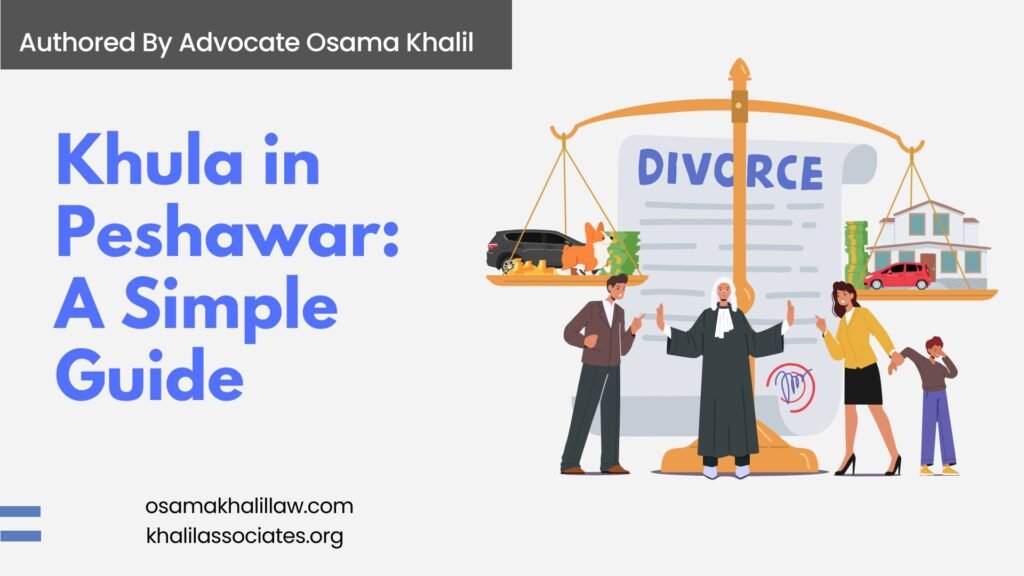
In Peshawar, Khula allows a Muslim woman to end her marriage through family court, even if her husband does not agree. Women seek Khula when they face domestic abuse, neglect, financial hardship, or lack of compatibility with their spouse. The Muslim Family Laws in Pakistan ensure women have the right to end marriages that harm their well-being.
Recognizing Grounds for Khula in Peshawar
Pakistan’s law, especially under Section 8 of the Muslim Family Laws Ordinance 1961, lists several grounds for Khula. Women in Peshawar commonly request Khula due to cruelty, abuse, abandonment, or lack of financial support from their husbands. For instance, if a husband disappears or fails to provide financially, the wife can pursue Khula to protect her rights and well-being.
Filing a Khula Petition
To start the Khula process in Peshawar, a woman files a Khula petition with the family court in her district or where the marriage was registered. Many women seek the help of a skilled family lawyer, who prepares and submits the petition accurately. After filing, the court notifies the husband, instructing him to attend the hearings. If he misses multiple notifications, the court may continue with the case in his absence.
Attending Court Hearings and Reconciliation Sessions
Once the petition process begins, the family court arranges reconciliation sessions. In these sessions, both spouses meet to discuss their issues and explore any chance of resolution. However, if the woman chooses to continue with Khula and declines reconciliation, the court respects her choice and proceeds with the case. After completing the reconciliation efforts, the court reviews the grounds and supporting evidence.
Receiving the Khula Decree
When the family court confirms the woman’s valid reasons, it issues a Khula decree, which formally dissolves the marriage. After receiving the decree, the woman or her lawyer submits it to the local Union Council. The Union Council then provides a Divorce Effectiveness Certificate, officially documenting the end of the marriage.
Estimating the Duration of the Khula Process in Peshawar
The time required for Khula cases in Peshawar varies. Delays may happen if the husband does not attend hearings or if the reconciliation sessions take longer than expected. However, on average, Khula cases take from a few weeks to several months. Women often shorten the timeline by consulting a reliable family lawyer who helps them avoid unnecessary delays.
Managing the Costs of Khula in Peshawar
The cost of a Khula case in Peshawar depends largely on the lawyer’s fees and level of experience. Some lawyers may charge higher fees due to their expertise, but they often bring efficiency and knowledge that helps their clients through the process. Women looking for more affordable options can find lawyers offering fixed-fee arrangements, making it easier to handle expenses.
Gathering Required Documents for Khula
To file for Khula, a woman generally needs her CNIC (identity card), a copy of her marriage certificate (Nikah Nama), and any additional documents supporting her grounds for Khula. Witnesses are usually unnecessary unless the court specifically requests them.
Final Thoughts on Pursuing Khula in Peshawar
Khula remains a vital right for women in Pakistan, allowing them to leave harmful or distressing marriages. Although the process involves several steps, a trusted lawyer helps simplify the procedure and reduces delays. Women in Peshawar seeking Khula often start by consulting a family lawyer to understand their options and pursue Khula confidently.
For professional assistance with Khula/Family matters, contact Osama Khalil, Lawyer & Legal Consultant, specializing in family law. You can reach him at:
Phone: +92-316-1829946 | +92-307-2732223
Email: osamakhalil9444@gmail.com | contact@khalilassociates.org
